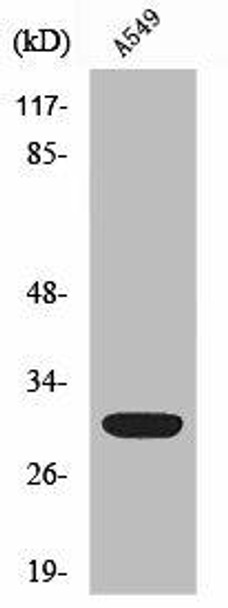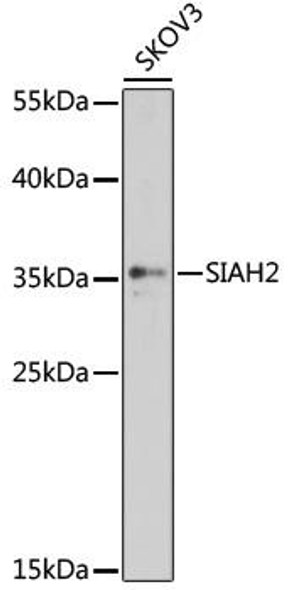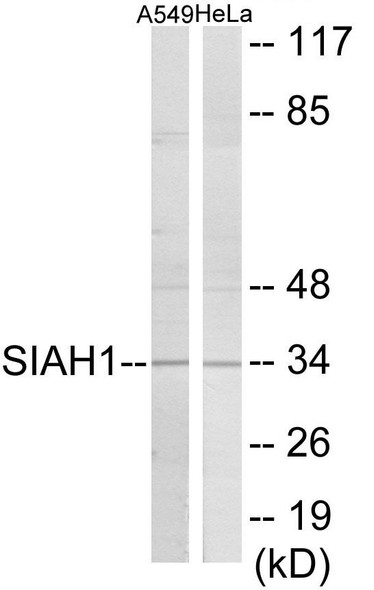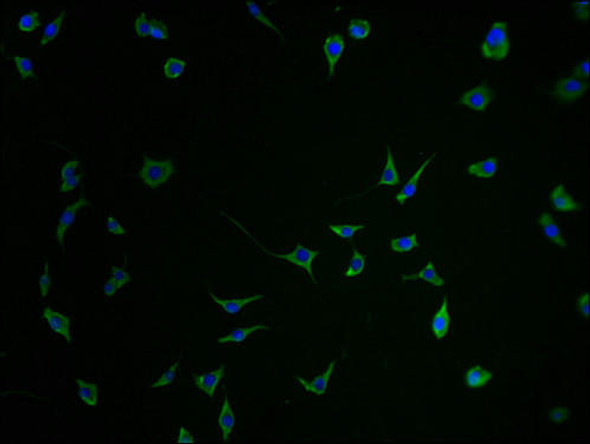Description
SIAH1/SIAH2 Antibody (PACO06813)
The SIAH1/SIAH2 Polyclonal Antibody (PACO06813) is a valuable tool for researchers studying the SIAH family of proteins, which are key regulators of cellular processes such as apoptosis and ubiquitination. This antibody, generated in rabbits, shows high reactivity with human samples and has been validated for use in Western blot applications.SIAH1 and SIAH2 are E3 ubiquitin ligases that play important roles in controlling the stability and activity of various proteins, including tumor suppressors and oncogenes. By targeting specific substrates for degradation, SIAH proteins influence cell proliferation, survival, and signaling pathways.
Understanding the functions of SIAH1 and SIAH2 is crucial for unraveling their contributions to cancer progression and other diseases.This polyclonal antibody binds specifically to SIAH1 and SIAH2 proteins, allowing for accurate detection and quantification in a variety of cell types and tissues. Its utility in immunology and cancer research makes it a valuable asset for investigating the intricate roles of SIAH family members in cellular homeostasis and disease development.
| Antibody Name: | SIAH1/SIAH2 Antibody (PACO06813) |
| Antibody SKU: | PACO06813 |
| Size: | 50ug |
| Host Species: | Rabbit |
| Tested Applications: | ELISA, WB, IHC, IF |
| Recommended Dilutions: | ELISA:1:10000, WB:1:500-1:2000, IHC:1:100-1:300, IF:1:200-1:1000 |
| Species Reactivity: | Human, Mouse, Rat |
| Immunogen: | Synthesized peptide derived from the Internal region of human Siah-1/2. |
| Form: | Liquid |
| Storage Buffer: | Liquid in PBS containing 50% glycerol, 0.5% BSA and 0.02% sodium azide. |
| Purification Method: | The antibody was affinity-purified from rabbit antiserum by affinity-chromatography using epitope-specific immunogen. |
| Clonality: | Polyclonal |
| Isotype: | IgG |
| Conjugate: | Non-conjugated |
 | Western Blot analysis of RAT-MUSCLE cells using Siah-1/2 Polyclonal Antibody. |
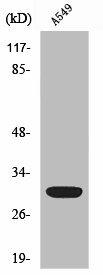 | Western Blot analysis of HeLa cells using Siah-1/2 Polyclonal Antibody. |
| Synonyms: | SIAH1; HUMSIAH; E3 ubiquitin-protein ligase SIAH1; Seven in absentia homolog 1; Siah-1; Siah-1a; SIAH2; E3 ubiquitin-protein ligase SIAH2; Seven in absentia homolog 2; Siah-2; hSiah2 |
| UniProt Protein Function: | SIAH1: E3 ubiquitin-protein ligase that mediates ubiquitination and subsequent proteasomal degradation of target proteins. E3 ubiquitin ligases accept ubiquitin from an E2 ubiquitin- conjugating enzyme in the form of a thioester and then directly transfers the ubiquitin to targeted substrates. Mediates E3 ubiquitin ligase activity either through direct binding to substrates or by functioning as the essential RING domain subunit of larger E3 complexes. Triggers the ubiquitin-mediated degradation of many substrates, including proteins involved in transcription regulation (MYB, POU2AF1, PML and RBBP8), a cell surface receptor (DCC), the cell-surface receptor-type tyrosine kinase FLT3, the cytoplasmic signal transduction molecules (KLF10/TIEG1 and NUMB), an antiapoptotic protein (BAG1), a microtubule motor protein (KIF22), a protein involved in synaptic vesicle function in neurons (SYP), a structural protein (CTNNB1) and SNCAIP. Confers constitutive instability to HIPK2 through proteasomal degradation. It is thereby involved in many cellular processes such as apoptosis, tumor suppression, cell cycle, axon guidance, transcription regulation, spermatogenesis and TNF-alpha signaling. Has some overlapping function with SIAH2. Induces apoptosis in cooperation with PEG3. Upon nitric oxid (NO) generation that follows apoptotic stimulation, interacts with S- nitrosylated GAPDH, mediating the translocation of GAPDH to the nucleus. GAPDH acts as a stabilizer of SIAH1, facilitating the degradation of nuclear proteins. Homodimer. Interacts with group 1 glutamate receptors GRM1 and GRM5. Interacts with DAB1, which may inhibit its activity. Interacts with UBE2E2. Interacts with PEG3. Interacts with GAPDH; leading to stabilize SIAH1. Component of some large E3 complex composed of UBE2D1, SIAH1, CACYBP/SIP, SKP1, APC and TBL1X. Interacts with UBE2I. Interacts with alpha- tubulin. Interacts with PEG10, which may inhibit its activity. Interacts with KHDRBS3. Interacts with SNCAIP and HIPK2. May be induced by p53/TP53, suggesting that it may be required to modulate p53/TP53 response. The relevance of such activity in vivo is however unclear and may not exist. Widely expressed at a low level. Down- regulated in advanced hepatocellular carcinomas. Inhibited by interaction with SNCAIP (isoform 2, but not isoform 1). May be inhibited by interaction with PEG10. Belongs to the SINA (Seven in absentia) family. 3 isoforms of the human protein are produced by alternative splicing. |
| UniProt Protein Details: | Protein type:Apoptosis; Cell development/differentiation; EC 6.3.2.-; EC 6.3.2.19; Ligase; Motility/polarity/chemotaxis; Ubiquitin conjugating system; Ubiquitin ligase Chromosomal Location of Human Ortholog: 16q12.1 Cellular Component: beta-catenin destruction complex; cytoplasm; cytosol; nucleus Molecular Function:identical protein binding; protein binding; protein C-terminus binding; ubiquitin-protein ligase activity; zinc ion binding Biological Process: anatomical structure morphogenesis; apoptosis; axon guidance; cellular protein metabolic process; nervous system development; neuron apoptosis; positive regulation of apoptosis; proteasomal ubiquitin-dependent protein catabolic process; protein catabolic process; protein polyubiquitination; protein ubiquitination during ubiquitin-dependent protein catabolic process; ubiquitin-dependent protein catabolic process |
| NCBI Summary: | This gene encodes a protein that is a member of the seven in absentia homolog (SIAH) family. The protein is an E3 ligase and is involved in ubiquitination and proteasome-mediated degradation of specific proteins. The activity of this ubiquitin ligase has been implicated in the development of certain forms of Parkinson's disease, the regulation of the cellular response to hypoxia and induction of apoptosis. Alternative splicing results in several additional transcript variants, some encoding different isoforms and others that have not been fully characterized. [provided by RefSeq, Jul 2008] |
| UniProt Code: | Q8IUQ4 |
| NCBI GenInfo Identifier: | 46577493 |
| NCBI Gene ID: | 6477 |
| NCBI Accession: | Q8IUQ4.2 |
| UniProt Secondary Accession: | Q8IUQ4,O43269, Q49A58, Q92880, A0FKF3, |
| UniProt Related Accession: | Q8IUQ4 |
| Molecular Weight: | Observed MW: 31kDaCalculated MW: 21kDa/31kDa/34kDa |
| NCBI Full Name: | E3 ubiquitin-protein ligase SIAH1 |
| NCBI Synonym Full Names: | siah E3 ubiquitin protein ligase 1 |
| NCBI Official Symbol: | SIAH1 |
| NCBI Official Synonym Symbols: | SIAH1A |
| NCBI Protein Information: | E3 ubiquitin-protein ligase SIAH1 |
| UniProt Protein Name: | E3 ubiquitin-protein ligase SIAH1 |
| UniProt Synonym Protein Names: | RING-type E3 ubiquitin transferase SIAH1Curated; Seven in absentia homolog 1; Siah-1; Siah-1a |
| Protein Family: | E3 ubiquitin-protein ligase |
| UniProt Gene Name: | SIAH1 |


